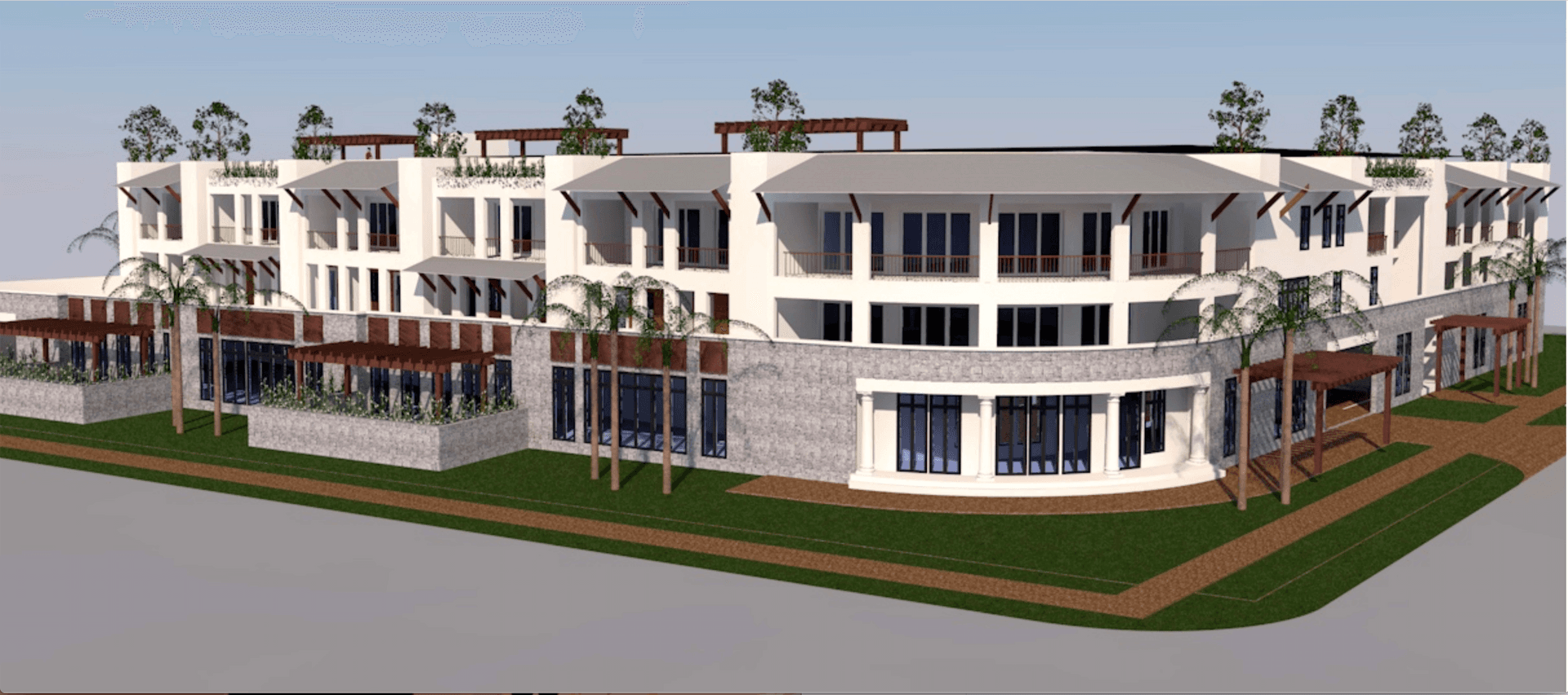This new green building may be just the thing to help a Florida town stand up to climate change. Or not.
Satellite Beach has rejected the anything-goes approach of much of Florida, and the city wants its new boutique hotel to be a model for environmentally responsible development. But is even one new building in this region one too many?
You’d be hard-pressed to find a community on Florida’s east coast without at least one hotel. After all, this is the state where visitors flock to long beaches and warm weather, and where hotels eager to put them up blanket the landscape.
But Satellite Beach prides itself on being a little bit different.
“The vibe here is really for the most part long-term residents,” says John Stone, a building official in the small city just south of Cape Canaveral. “[It’s] what we call a bedroom community.”
A bedroom community that boasts nearly three miles of pristine coastline, a reef offshore where sea turtles frolic and a lagoon out back where manatees loll in the calm water. Local mom-and-pop restaurants serve up seafood close to the beach.
The city is still relatively undeveloped, and that’s partly by design.
“Some time ago we made some decisions,” Stone says. “One of them is we value our oceanfront and we preserve 40 percent of [it] in conservation. So it will never be built on, whether it be a single-family home or a hotel.”
More from Satellite Beach: One small Florida city tries to adapt to climate change, mostly alone
But the city’s hotel-free days may soon be over. After years of saying no to the Ramadas of the world, Satellite Beach has said yes to the construction of a small, boutique hotel and apartment complex a block from the beach.
Architect Lawrence Maxwell says the project will deliver on what this environmentally conscious city is looking for — something with a low carbon footprint that’s extremely energy efficient and can withstand the increasingly harsh storms and floods that climate change is bringing to the region.
“Everything we’re doing is to be a showcase of how to do a project environmentally correct,” Maxwell says. “We took on an aesthetic of an old Florida hotel back from the late 1800s, early 1900s,” which he says has “a lot of nice environmental aspects to it.”
But it will also have some important contemporary twists, like a new construction technique that will allow the building to stand up to 200 mph hurricane winds while using about half the concrete of a typical building.
Less concrete means a lower carbon footprint from construction. The hotel will also be built to minimize the use of power-hungry air conditioning. The roof will house a vegetable garden and solar panels.
That last feature might not be considered a big leap forward in many parts of the country these days, but solar power is still something of a novelty around here, and the hotel will be the first in this part of Florida to run on solar power.
That’s something Jim Fenton finds ironic.
“We brag that we’re the sunshine state here in Florida and people come to Florida for the sunshine,” says Fenton, who runs the Solar Energy Center at the University of Central Florida. He points out that solar isn’t just relatively clean and plentiful here — these days, it can also be cheaper than some conventional energy sources.
Backers of the project hope all these features will make Satellite Beach’s new hotel an example to others in a region that’s often indifferent to environmental concerns.

And it’s part of a broader effort by the city to show the way toward more responsible development and preparing for the growing effects of climate change, including rising sea levels and more powerful storms like Hurricane Irma, which hit Florida in September.
The city is raising roads, moving key city infrastructure like the fire station — which keeps getting flooded — and carefully scrutinizing all new construction to make sure it can withstand increasingly ferocious storms.
But for some who’ve watched Florida’s response to the growing global climate crisis, all these innovations fall short.
“I don’t believe we can engineer our way out of this,” says Charles Kibert, a professor of construction management at the University of Florida in Gainesville
The hotel is still another building close to the beach. And Kilbert says there’s just too much building of every kind going on here.
“Even in Miami today, where there are the signs of climate change everywhere, there’s a building boom going on,” Kibert says. “Which makes, if you think about it, very little sense. But there’s no negative signals being sent to make it … financially difficult for people to build in these areas, or even banning construction in certain areas.”
At the very least, Kibert says, new buildings shouldn’t just have a lower carbon footprint than older ones — they should have the lowest impact possible. He says the new Satellite Beach hotel tries to do this, but there will still be an environmental cost.
But city official Stone says not building at all wasn’t an option. The plot where the new hotel will sit was home to an abandoned restaurant. Stone says residents felt it was an eyesore and wanted something done with it. But not just anything.
“People said, we don’t want a gas station, we don’t want a fast food restaurant,” Stone says.
So instead, the city bought the land itself, and proceeded full steam ahead with what residents did want — the greenest, most environmentally friendly hotel they can build.
And, for better or worse, finally a place visitors can stay in Satellite Beach. At least for now.
